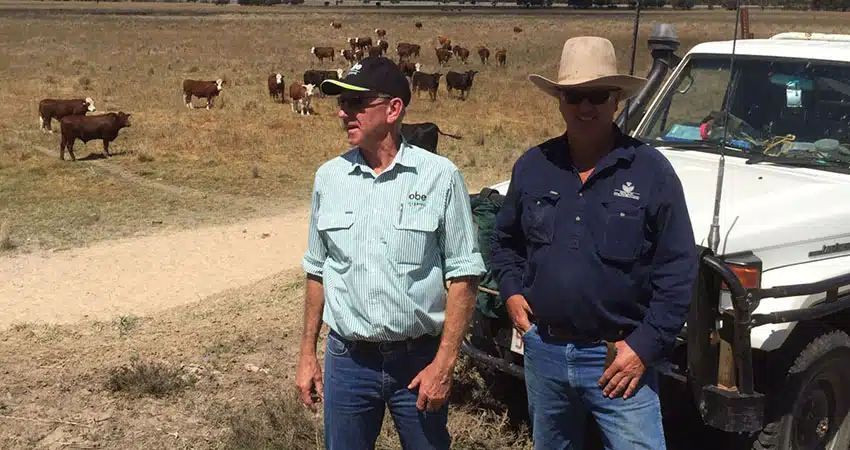There has been a lot of talk about the need for Australian agriculture to attract capital, but it takes more than just money to make a productive farm. Investing in human capital is just as important for building multi-generational cattle businesses, and OBE Organic is working hard to help Australian cattle producers do just this.
Grazing is a business, and the more skilled graziers are, the more likely they are to flourish. OBE Organic is helping cattle producers improve their skills in several key areas.
• Best management practices. In 2015 OBE Organic became the first corporate partner of Grazing BMP, a voluntary industry-owned tool for assessing all aspects of a cattle enterprise across almost 150 best practice standards. We aim to hold these every 6 months, to help producers continually re-assess and improve their skills. Two OBE Organic Grazing BMP Forums have attracted 59 producers and we are hoping for another bumper crowd at our next event in Birdsville, in September. Click here to learn more about the event from the 27th to the 29th of September.
• Skills training. As well as helping producers continually improve their individual businesses, Grazing BMP pinpoints areas that many producers would like to do better in. As a result, we supported training in succession planning in Charleville (attended by 28 producers) and we will support the delivery of spatial mapping training in Birdsville.
• Farm safety. Farm safety is another area for improvement identified through our Grazing BMP partnership – not surprising as the livestock industry has a terrible safety record. After supporting the delivery of a half-day farm safety workshop at Charleville, we wanted to do more to help cattle producers reduce their risk of injury. We have since worked with Workplace Health and Safety Queensland and WorkCover to develop a series of webinars and templates specific to the cattle industry. These webinars, designed to make farm safety less daunting and more accessible for cattle producers, are running monthly from July 2016 – March 2017.
• Biosecurity. Improving biosecurity risk management is crucial for the Australian beef industry and individual properties. To help the organic cattle industry, OBE Organic has supported the Livestock Biosecurity Network to create a Biosecurity Planning Workbook for Organic Livestock Enterprises. Organic cattle producers already have good biosecurity practices in place to meet certification requirements, and this Workbook provides checklists to help organic cattle producers build on that foundation.
• Collaboration. Producing organic beef in the bush can be a lonely job, but we know producers love to help each other out. We established the Organic Beef Producers Forum on Facebook in early 2016 to provide a platform for producers to overcome the tyranny of distance, share knowledge, ask questions and collaborate. Over 370 people have joined this group so far.
Money is still important
Of course, financial capital is still important and organic premiums are a welcome bonus for our cattle producers. But money is not the only thing that keeps farmers on the land.
As the ABARES Executive Director Karen Schneider said earlier this year, “We know improving productivity will be critical to the success of Australian agriculture on world markets. That’s going to require investment across the board—in land, in technology and in our people.”
We like to think OBE Organic is doing its bit to help organic producers boost their productivity with improved skills.
* Data Sources
Livestock source: Workplace Health and Safety Queensland Qld Livestock Industry Action Plan
https://www.worksafe.qld.gov.au/__data/assets/pdf_file/0015/111660/livestock-industry-action-plan-2015-5492.pdf
Other industry statistics source;
Austalian Workers Compensation Statistics 2013-14, Table 15
https://www.worksafe.qld.gov.au/__data/assets/pdf_file/0015/111660/livestock-industry-action-plan-2015-5492.pdf










